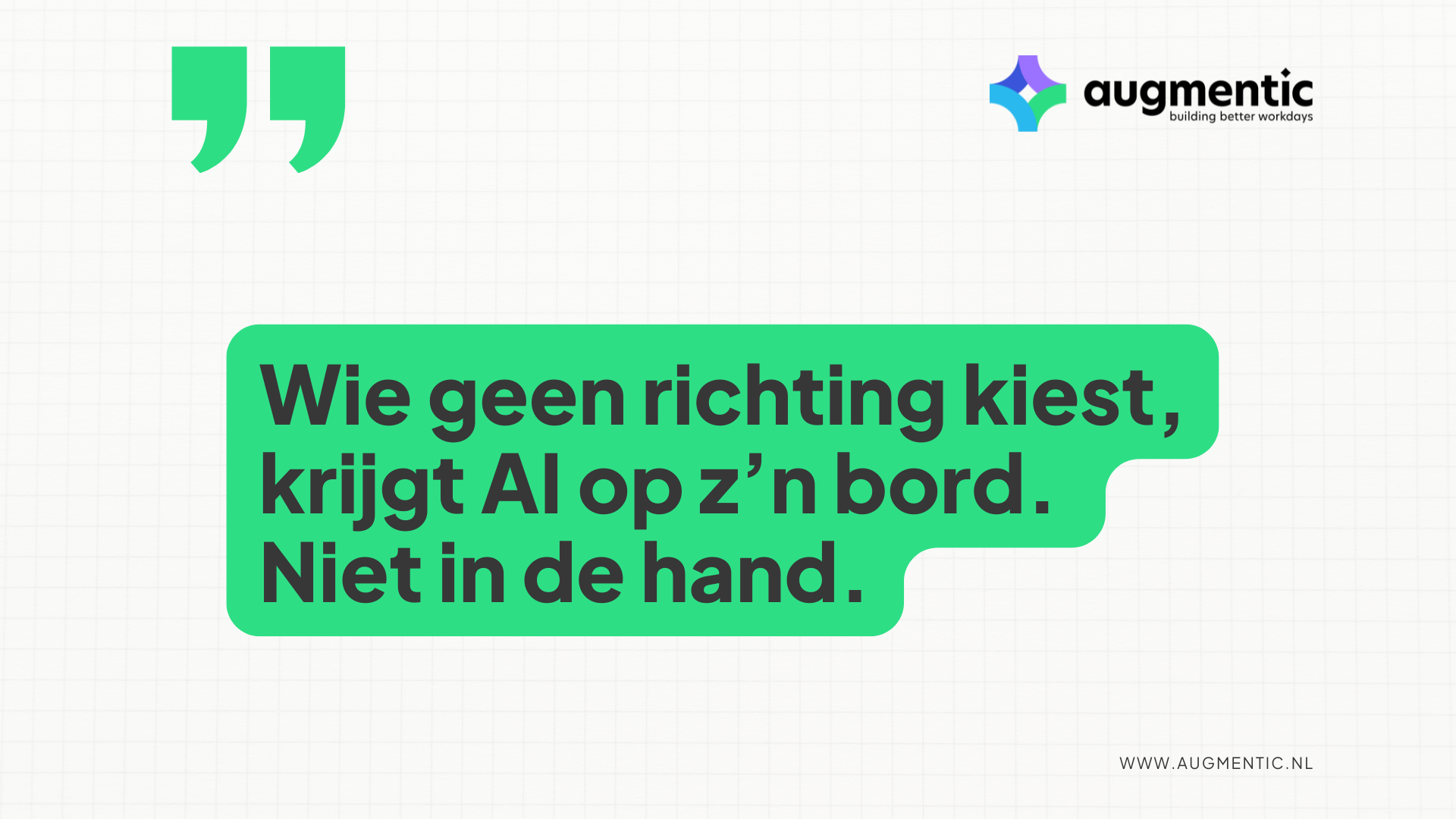Augmentic BV
Haaswijkweg east 12B
3319 GC Dordrecht
The Netherlands
Augmentic BV
Haaswijkweg east 12B
3319 GC Dordrecht
The Netherlands

AI does not change work by itself. It reinforces existing structures - unless we actively choose transparency, inclusion and meaning. The UN report makes clear: Without vision, inequality grows. With the right choices, AI can strengthen work rather than displace it. It is not the technology itself but our direction that determines the outcome.

There is a persistent perception that technology defines our future. That AI is some kind of inevitable wave that we just have to surf along on, or go under.
But that image is not accurate.
AI is not a force of nature. Not an autonomous entity. It is a tool - smart, fast and powerful, but completely dependent on the context in which it is applied. And therefore on the choices we make. Choices about who benefits, who has control, who gets access, and what we as a society care about.
That's exactly where the Human Development Report 2025 of the United Nations the finger. Not on the technology itself, but on the social and political issues associated with it. On the tensions between acceleration and inequality. Between automation and meaningful work. Between global AI capacity and local human resilience.
And above all, on the realization that AI is not happening to us. We build it. And so we can also choose how to deploy it.

One of the report's most powerful signals: AI is not making inequality smaller, but rather larger. Not necessarily because it is inevitable - but because existing inequality is ingrained in the way we design, distribute and apply technology.
The report makes clear that the distribution of AI power (such as computing capacity, data centers and AI investment) is heavily skewed. A few countries and tech companies dominate. The rest are watching. Differences are also emerging within countries: between the highly educated and less educated, between regions, and between people who have access to AI and those who mainly suffer its results.
"Artificial Intelligence is accelerating human development - for some. For others, it may entrench exclusion and inequality." (UNDP HDR 2025)
What does that mean? That AI is not a neutral tool. It is a mirror. And what we see in it depends on the choices we make about design, ownership, governance and use.
What the report shows well - and what we experience daily in the practice of organizations - is that AI rarely goes wrong at the technical level. It is often not the algorithm that fails, but the process around it. The assumptions. The lack of dialogue. The lack of direction.
Take, for example, the impact of AI on work. On paper, AI offers enormous benefits: productivity, speed, better decision support. But in reality, many workers feel mostly uncertainty: will my job soon be different? Will I be outflanked by technology I don't understand?
The UNDP shows that this fear is real: globally, 64% of people expect AI to affect their work - but less than half think their organization or government will help them be prepared for it.
The problem is not just what AI does. It's what we fail to do with it.
So what should be done? The report outlines three necessary directions:
What stands out here: the report repeatedly mentions the importance of "redesigning work" - not from a technological blueprint, but from the experience and value of people themselves.
"Meaningful work is not a luxury. It is a cornerstone of dignity, inclusion and resilience." (UNDP HDR 2025)
For companies, governments and institutions, this is the time to take charge. Not about AI as a technology - but about what you want to achieve with it.
In our practice at Augmentic, we see the need for this right now. Organizations that are inundated with AI tools, AI promise and AI panic, but hardly take time to fundamentally consider the question: what problem are we actually trying to solve?
What we are increasingly doing is going back to the core:
We are building on that with Augmentic_OS - a platform in which AI agents exist not as stand-alone features, but as accountable, measurable and human-centered colleagues. Not to replace work, but to redesign it - smarter, more transparent and meaningful.
What this report exposes is not a lack of innovation. It is a lack of vision. And exactly that is also the invitation: dare to choose. Not for "which AI to use," but for What you want AI to mean.
Work does not automatically get better from smart systems. That requires choices. About ownership. About collaboration. About human-centered design.
And those choices, they don't lie with technology. They lie with us.
📚 Based on the Human Development Report 2025 - "A Matter of Choice: People and Possibilities in the Age of AI," published by UNDP in May 2025.